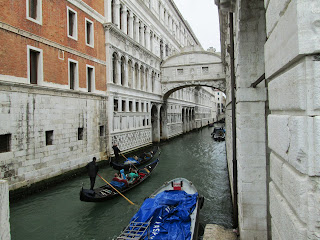The Bridge of Sighs leading from the Doge's palace to the prisons in Venice.
Venice is a strange place. Perhaps it always has been. A bunch of farmers make wood and clay pylons out in the ocean to build a city that will be impervious to the invading Lombards? It sound like something from the BioShock series. This little outpost of the Byzantine Empire became and empire in its own right with the local Roman Dux elevated to Doxe, or Doge as leader of an independent republic. They even stole Saint Mark's corpse from Egypt so that they could have a suitable talisman to ensure divine protection and increase of profits ("the spice must flow" anyone?). At the height of their power, the Venetians even dared to sack Constantinople and put their own emperor on the throne. It took Napoleon to take these guys down.
Anyhow, the city seems to retain much of that strangeness today -at least to this outsider. There was a feeling of closeness, of a place turned inward upon itself that I didn't necessarily sense in the rest of Italy. Maybe it was just the rain, maybe we were all tired -I don't know. The city was beautiful, strange, and impenetrable, and I'm happy with very few of the pictures I took in this place.
Venice is a strange place. Perhaps it always has been. A bunch of farmers make wood and clay pylons out in the ocean to build a city that will be impervious to the invading Lombards? It sound like something from the BioShock series. This little outpost of the Byzantine Empire became and empire in its own right with the local Roman Dux elevated to Doxe, or Doge as leader of an independent republic. They even stole Saint Mark's corpse from Egypt so that they could have a suitable talisman to ensure divine protection and increase of profits ("the spice must flow" anyone?). At the height of their power, the Venetians even dared to sack Constantinople and put their own emperor on the throne. It took Napoleon to take these guys down.
Anyhow, the city seems to retain much of that strangeness today -at least to this outsider. There was a feeling of closeness, of a place turned inward upon itself that I didn't necessarily sense in the rest of Italy. Maybe it was just the rain, maybe we were all tired -I don't know. The city was beautiful, strange, and impenetrable, and I'm happy with very few of the pictures I took in this place.

Comments